“Cape May County is ground zero for this issue nationally,” state Sen. Michael Testa says of opposition to offshore wind farms.
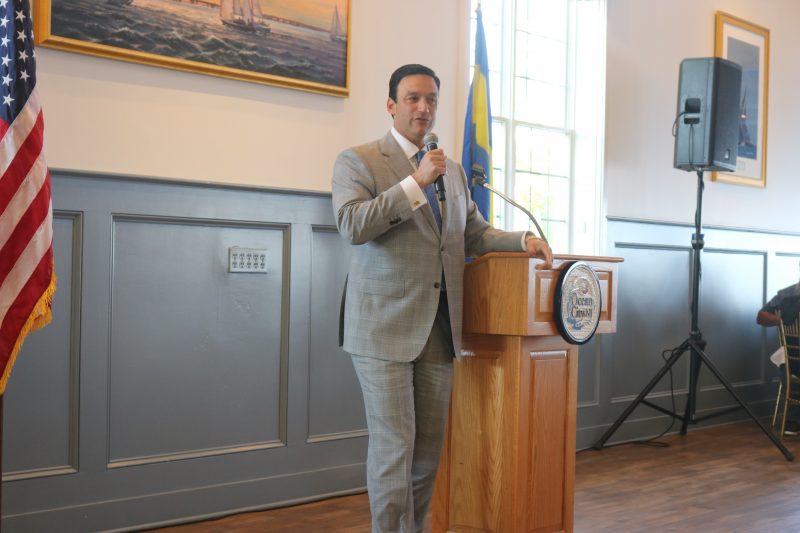 By DONALD WITTKOWSKI
Cape May County’s legal and political battle against a proposed offshore wind energy farm is gaining public support across New Jersey, a state lawmaker told Ocean City business leaders during a forum Thursday that touched on a series of hot button issues.
“We’re fighting against the industrialization of our ocean,” Sen. Michael Testa said in remarks to the Ocean City Regional Chamber of Commerce about the Ocean Wind 1 project planned 15 miles off the South Jersey coast.
Testa and his fellow Republican members of the First Legislative District team, Assemblyman Antwan McClellan and Assemblyman Erik Simonsen, appeared before the Chamber at the Ocean City Yacht Club to discuss the wind farm project, ongoing efforts to curb rowdy teenage behavior at the shore and New Jersey’s controversial health and sex standards in public schools.
Cape May County, Ocean City and other groups have filed multiple lawsuits against federal and state agencies in hopes of blocking the project proposed by the Danish energy giant Orsted. The latest suit was filed this week against the federal regulatory agencies that approved the environmental and construction permits for the wind farm.
The litigation alleges that the federal government violated laws that protect the environment and endangered species, while also failing to properly consider the possible negative impacts on Cape May County’s tourism industry.
Ocean City Mayor Jay Gillian and Sea Isle City Mayor Leonard Desiderio, who also serves as director of the Cape May County Board of Commissioners, are among the most prominent opponents of the wind farm.
Orsted’s project would include 98 wind turbines stretching along the coast between Atlantic City and Stone Harbor. Scheduled to be completed by December 2025, the project would be the first in a series of wind energy farms built off the New Jersey coast.
“Cape May County is ground zero for this issue nationally,” Testa declared of the Orsted project. “All eyes are on us.”
By DONALD WITTKOWSKI
Cape May County’s legal and political battle against a proposed offshore wind energy farm is gaining public support across New Jersey, a state lawmaker told Ocean City business leaders during a forum Thursday that touched on a series of hot button issues.
“We’re fighting against the industrialization of our ocean,” Sen. Michael Testa said in remarks to the Ocean City Regional Chamber of Commerce about the Ocean Wind 1 project planned 15 miles off the South Jersey coast.
Testa and his fellow Republican members of the First Legislative District team, Assemblyman Antwan McClellan and Assemblyman Erik Simonsen, appeared before the Chamber at the Ocean City Yacht Club to discuss the wind farm project, ongoing efforts to curb rowdy teenage behavior at the shore and New Jersey’s controversial health and sex standards in public schools.
Cape May County, Ocean City and other groups have filed multiple lawsuits against federal and state agencies in hopes of blocking the project proposed by the Danish energy giant Orsted. The latest suit was filed this week against the federal regulatory agencies that approved the environmental and construction permits for the wind farm.
The litigation alleges that the federal government violated laws that protect the environment and endangered species, while also failing to properly consider the possible negative impacts on Cape May County’s tourism industry.
Ocean City Mayor Jay Gillian and Sea Isle City Mayor Leonard Desiderio, who also serves as director of the Cape May County Board of Commissioners, are among the most prominent opponents of the wind farm.
Orsted’s project would include 98 wind turbines stretching along the coast between Atlantic City and Stone Harbor. Scheduled to be completed by December 2025, the project would be the first in a series of wind energy farms built off the New Jersey coast.
“Cape May County is ground zero for this issue nationally,” Testa declared of the Orsted project. “All eyes are on us.”
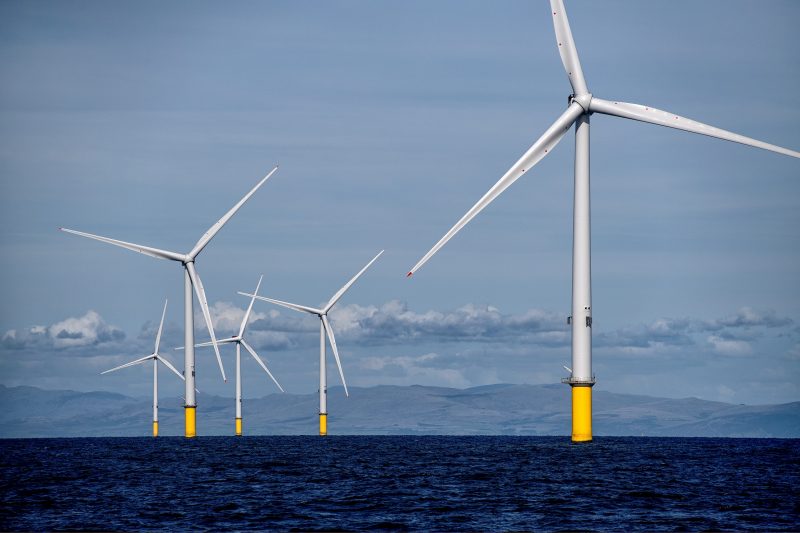 The proposed wind farm project would be 15 miles off the South Jersey coast. (Photo courtesy of Orsted)
Opponents have denounced the project for what they believe will be catastrophic economic and environmental impacts on the Jersey Shore’s tourism, commercial and recreational fishing industries, migratory birds and coastal marine life such as whales and dolphins. They also believe that the project’s towering wind turbines would create a visual blight when viewed from land.
“We have one chance to get this right or catastrophically wrong,” Testa said.
Particularly worrisome to Cape May County is the harm that the wind farm project would cause to tourism, Testa said. He pointed out that Orsted’s own analysis of the project concluded that Cape May County would suffer a 15 percent decline in its nearly $7 billion annual tourism industry.
“If tourism is cut 15 percent, I want everyone to think what that means to small businesses on the Boardwalk,” Testa said.
Gov. Phil Murphy, a Democrat, wants to make New Jersey a national leader in wind farm technology to introduce greener forms of energy that would help counter the effects of climate change.
Orsted has put up a $100 million guarantee that it will build New Jersey’s first offshore wind farm by December 2025, and has agreed to forfeit the money if it fails to meet that deadline.
According to news reports, that money was placed in an escrow account required under the terms of a law Murphy signed in July allowing Orsted to keep federal tax credits that it otherwise would have had to return to New Jersey ratepayers.
Testa said those tax credits amounted to an additional $1 billion in subsidies diverted away from New Jersey taxpayers to help a foreign corporation build the wind farm.
“It’s so disturbing to me. This is what keeps me up at night. This is un-American,” he said of the U.S. economic benefits being given to the Denmark-based Orsted.
The proposed wind farm project would be 15 miles off the South Jersey coast. (Photo courtesy of Orsted)
Opponents have denounced the project for what they believe will be catastrophic economic and environmental impacts on the Jersey Shore’s tourism, commercial and recreational fishing industries, migratory birds and coastal marine life such as whales and dolphins. They also believe that the project’s towering wind turbines would create a visual blight when viewed from land.
“We have one chance to get this right or catastrophically wrong,” Testa said.
Particularly worrisome to Cape May County is the harm that the wind farm project would cause to tourism, Testa said. He pointed out that Orsted’s own analysis of the project concluded that Cape May County would suffer a 15 percent decline in its nearly $7 billion annual tourism industry.
“If tourism is cut 15 percent, I want everyone to think what that means to small businesses on the Boardwalk,” Testa said.
Gov. Phil Murphy, a Democrat, wants to make New Jersey a national leader in wind farm technology to introduce greener forms of energy that would help counter the effects of climate change.
Orsted has put up a $100 million guarantee that it will build New Jersey’s first offshore wind farm by December 2025, and has agreed to forfeit the money if it fails to meet that deadline.
According to news reports, that money was placed in an escrow account required under the terms of a law Murphy signed in July allowing Orsted to keep federal tax credits that it otherwise would have had to return to New Jersey ratepayers.
Testa said those tax credits amounted to an additional $1 billion in subsidies diverted away from New Jersey taxpayers to help a foreign corporation build the wind farm.
“It’s so disturbing to me. This is what keeps me up at night. This is un-American,” he said of the U.S. economic benefits being given to the Denmark-based Orsted.
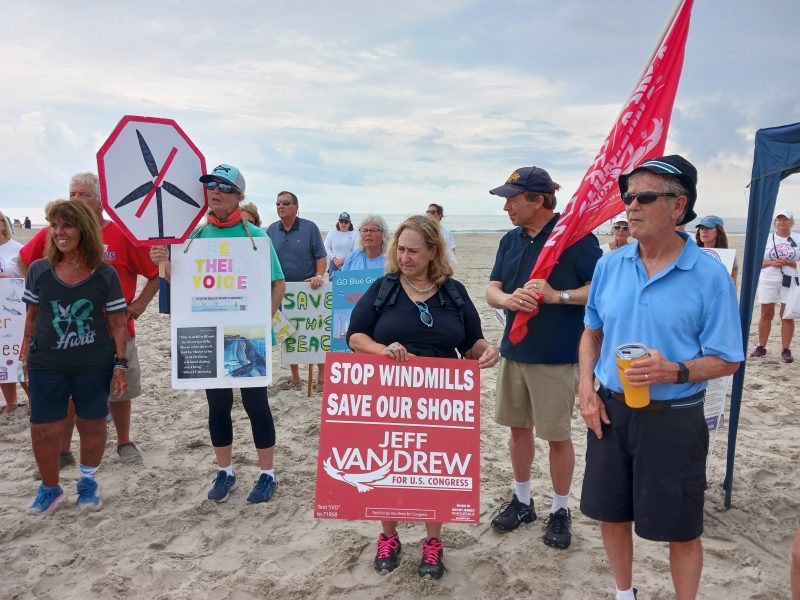 During a rally in September, protesters gather on the 35th Street beach in Ocean City to denounce Orsted's offshore wind farm.
Testa said Republicans are not opposed to clean energy, but they believe the wind farm has been rushed through by state and federal agencies without the proper regulatory reviews and approvals. He said New Jersey Republicans “want to talk some sense into the other side of the aisle.”
While the political and legal battles continue, Testa said there are indications that public opposition to the wind farm projects is growing across New Jersey. He cited one poll conducted by a super PAC he belongs to that found that opposition to wind farms in New Jersey has climbed to 72 percent.
“The people of Ocean City, the people of Cape May County and the people of New Jersey should be heard on this issue,” he said.
In other remarks, Assemblymen McClellan and Simonsen separately addressed the Chamber of Commerce about rowdy teenagers that have been causing trouble during the summer tourism season and New Jersey’s controversial sex and health standards for public school students.
McClellan said Republicans are planning to bring up a bill during the Legislature’s lame-duck session in late November that would give police more power to crack down on troublesome teens.
The bill would allow police to detain juveniles caught drinking alcohol or using marijuana in public and to notify their parents or legal guardians. The juveniles, though, would not be arrested.
Under state laws enacted in 2021 that were part of Gov. Murphy’s juvenile justice reforms, police are currently limited to giving teens “curbside warnings” for drinking in public.
During a rally in September, protesters gather on the 35th Street beach in Ocean City to denounce Orsted's offshore wind farm.
Testa said Republicans are not opposed to clean energy, but they believe the wind farm has been rushed through by state and federal agencies without the proper regulatory reviews and approvals. He said New Jersey Republicans “want to talk some sense into the other side of the aisle.”
While the political and legal battles continue, Testa said there are indications that public opposition to the wind farm projects is growing across New Jersey. He cited one poll conducted by a super PAC he belongs to that found that opposition to wind farms in New Jersey has climbed to 72 percent.
“The people of Ocean City, the people of Cape May County and the people of New Jersey should be heard on this issue,” he said.
In other remarks, Assemblymen McClellan and Simonsen separately addressed the Chamber of Commerce about rowdy teenagers that have been causing trouble during the summer tourism season and New Jersey’s controversial sex and health standards for public school students.
McClellan said Republicans are planning to bring up a bill during the Legislature’s lame-duck session in late November that would give police more power to crack down on troublesome teens.
The bill would allow police to detain juveniles caught drinking alcohol or using marijuana in public and to notify their parents or legal guardians. The juveniles, though, would not be arrested.
Under state laws enacted in 2021 that were part of Gov. Murphy’s juvenile justice reforms, police are currently limited to giving teens “curbside warnings” for drinking in public.
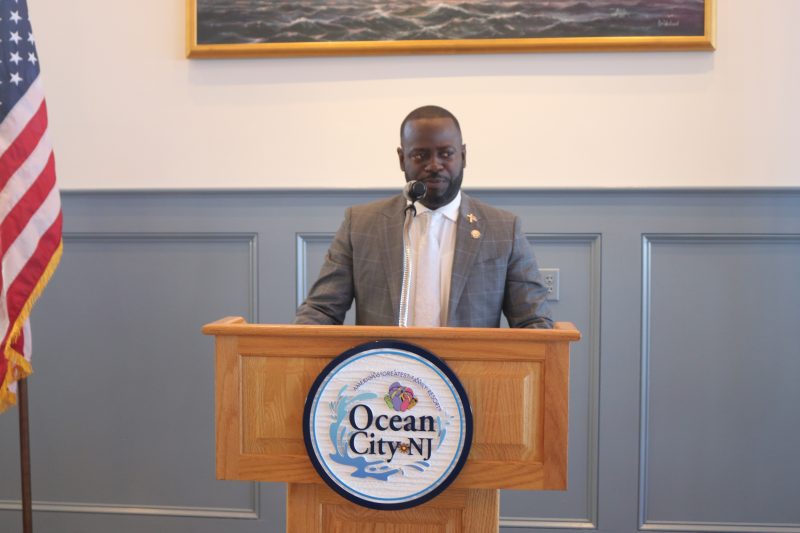 Assemblyman Antwan McClellan tells the audience that a proposed bill would give police more power to deal with rowdy teens at the shore.
Elected leaders and law enforcement officials in Ocean City, Sea Isle and other Jersey Shore communities have repeatedly complained that police are severely limited by the state laws in preventing teens from disrupting the beach towns.
“It’s not just a Cape May County problem or an Ocean City problem. It’s an entire Atlantic coast problem,” McClellan said.
However, McClellan noted that the Republican sponsors of the proposed legislation have been working with key Democrats to get the bill approved during the lame-duck session.
He said the legislation would effectively “give power back to police” for the 2024 summer tourism season.
“We’re going to do what we need to do to protect our shores,” McClellan said.
Meanwhile, Simonsen’s remarks to the Chamber focused on the state’s sex education and health standards that critics believe are too explicit for schoolchildren.
Simonsen, who is one of those critics, asserted that schools should get back to the basics of teaching children instead of “putting things in this curriculum that should be left at home.”
The sex education curriculum, developed by Gov. Murphy’s administration in 2020, offers new guidance on how schools should teach sex and gender identity. Controversial topics such as sexual orientation and abortion have ignited a storm of opposition among Ocean City parents and other members of the community in recent months.
Simonsen has been an educator for 31 years in Cape May County. He has served as a special education teacher, a vice principal and is now the athletic director for Lower Cape May Regional High School.
He characterized the sex and health standards as “bizarre,” while promising that opponents will continue their fight to change the curriculum.
Assemblyman Antwan McClellan tells the audience that a proposed bill would give police more power to deal with rowdy teens at the shore.
Elected leaders and law enforcement officials in Ocean City, Sea Isle and other Jersey Shore communities have repeatedly complained that police are severely limited by the state laws in preventing teens from disrupting the beach towns.
“It’s not just a Cape May County problem or an Ocean City problem. It’s an entire Atlantic coast problem,” McClellan said.
However, McClellan noted that the Republican sponsors of the proposed legislation have been working with key Democrats to get the bill approved during the lame-duck session.
He said the legislation would effectively “give power back to police” for the 2024 summer tourism season.
“We’re going to do what we need to do to protect our shores,” McClellan said.
Meanwhile, Simonsen’s remarks to the Chamber focused on the state’s sex education and health standards that critics believe are too explicit for schoolchildren.
Simonsen, who is one of those critics, asserted that schools should get back to the basics of teaching children instead of “putting things in this curriculum that should be left at home.”
The sex education curriculum, developed by Gov. Murphy’s administration in 2020, offers new guidance on how schools should teach sex and gender identity. Controversial topics such as sexual orientation and abortion have ignited a storm of opposition among Ocean City parents and other members of the community in recent months.
Simonsen has been an educator for 31 years in Cape May County. He has served as a special education teacher, a vice principal and is now the athletic director for Lower Cape May Regional High School.
He characterized the sex and health standards as “bizarre,” while promising that opponents will continue their fight to change the curriculum.
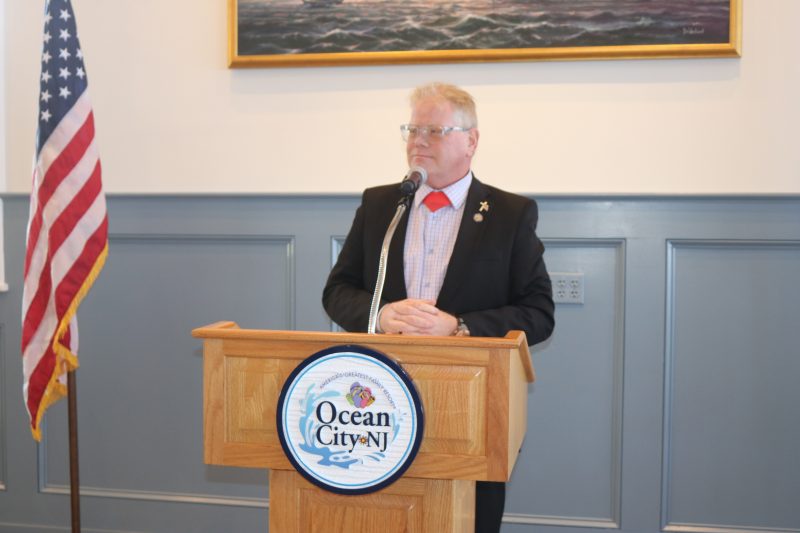 Assemblyman Erik Simonsen believes that the state's new sex and health standards go too far for school children.
Assemblyman Erik Simonsen believes that the state's new sex and health standards go too far for school children.